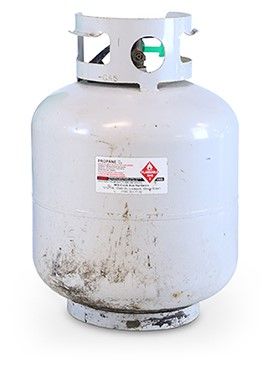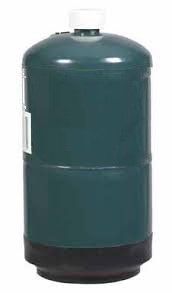

Propane Tanks
Propane tanks, also called propane cylinders, are commonly used to fuel stoves, grills, and water heaters. Propane tanks are made of recyclable steel and copper. But due to the gas and pressure inside, these tanks cannot be recycled with your other curbside recycling or thrown in the garbage. If any gas is left in the tank, it could cause a fire or explosion at the landfill. You should not open a tank to let the rest of the gas leak out because it’s highly flammable. These pressurized containers are not welcomed in the trash because they create a potential hazard of explosions or fires in compactor trucks – and definitely not recyclable in the curbside cart.
So, what are your options?
- Get your tank refilled at the point of purchase.
- If the tank is no longer needed, take it back where you got it.
- Many Walgreens, Walmart, and Ace Hardware locations offer trade-in or disposal/recycling programs.
- Take smaller propane tanks to a household hazardous waste facility – visit websites for details.
Chicago HHW
1150 N. North Branch Street
Tues: 7 am to noon
Thurs: 2 pm to 7 pm
First Sat. of each month: 8am to 3 pm
Naperville HHW
156 Fort Hill Drive
Sat: 9 am to 2 pm
Sun: 9 am to 2 pm
- Contact a local propane specialized recycler, such as AmeriGas.
AmeriGas
522 South Vermont St
Palatine, IL 60067
(847) 359-6450
For a large, bulk propane tank at a home or business, contact a licensed propane company, such as your propane supplier for removal. They’ll be able to safely purge any remaining propane from the tank. They’ll also have the specialized tools to remove the tank safely.
Helium Tanks
Helium tanks can be dangerous if not properly prepared for recycling. Helium tanks, much like propane tanks or fire extinguishers, contain pressurized gas that can explode if handled incorrectly. This is unlikely to happen around your house, but if a full helium tank goes into the back of a compactor truck it can blow up, hurting or even killing sanitation workers.
Steps to Take:
- Ask yourself, “Are balloons really necessary for my gathering?” Balloons, especially helium, can float long distances and pose a threat to animals and eco systems if released into the outdoors.
- Buy prefilled balloons at the store.
- Many party stores rent helium tanks that you can return when you are finished.
- You can also purchase a large empty tank and have it filled at a party store or industry supply company when needed.
- Balloon Time has instructions and a video that takes you step by step through the process of depressurizing helium tanks. The key is to make sure the tank is completely empty, remove the valve, then punch a hole in the tank so it is safe for recycling.
The metal that makes up your old helium tank is very easy for a metal recycler to turn into something else. There is no reason to throw this valuable resource in the trash when it can have a second life as a useful product. Check with a HHW facility or find a local metal scrap yard for a recycling option.
